'Somerset is a hotspot for lyme disease'

A tick has to be attached to a person for a while before it can give the lyme bacteria
- Published
An increase in ticks has made the South West a "hotspot" for lyme disease, experts have said.
The UK has been experiencing warmer winters, which has led to a rise in tick population.
A small number of the insects carry lyme disease, which can trigger years of aches and fatigue.
Ecologist Nathan Orr said warmer, wetter winters are not killing off as many of the ticks as in the past.
Experts told BBC Radio Somerset that wearing long trousers on walks and checking for tick bites are the best ways to prevent the disease.
Mr Orr, an ecologist for the Mendips Hill National Landscapes, said: "We think the warmer and wetter weather this winter hasn't caused a die-out of populations you would normally see when it's a much colder winter."
Howard Carter, insect and tick bite prevention expert, added: "Somerset is a lyme hotspot."
"There is definitely an increase in ticks in the UK," he added.
"Lyme disease is a very debilitating disease, it's the only disease carried by an organism in the UK that can be fatal.
"It can ruin peoples' lives."

Mr Orr said that ticks are important for the ecosystem, despite their danger for humans
Mr Orr said that he "loves" all the "slightly weird and more creepy things" such as ticks.
"They are an important part of the ecosystem. They also provide a huge amount of food for other creatures like birds and ants.
Only about 5% of ticks carry lyme disease, he added.
However, he still suggested wearing long trousers when out on a walk.
"I know it's really tempting in the hot weather to go walking in your shorts, but there are a whole range of problems you might encounter if you are wearing shorts on your walks.
"When you get back, check yourself to see if you picked up a tick.
"It has to be attached to you for quite a long time before it can give you the bacteria."
Follow BBC Somerset on Facebook, external and X, external. Send your story ideas to us on email or via WhatsApp on 0800 313 4630.
Related topics
- Published17 June 2019

- Published29 March 2024
